Sonata form - Study guides, Class notes & Summaries
Looking for the best study guides, study notes and summaries about Sonata form? On this page you'll find 309 study documents about Sonata form.
Page 4 out of 309 results
Sort by
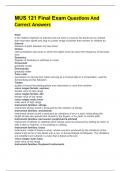
-
MUS 121 Final Exam Questions And Correct Answers
- Exam (elaborations) • 31 pages • 2024
-
- $15.48
- + learn more
MUS 121 Final Exam Questions And Correct Answers Pitch is the relative highness or lowness that we hear in a sound. No doubt you've noticed that most men speak and sing in a lower range of pitches than women or children do. Interval distance in pitch between any two tones Octave interval between two tones in which the higher tone has twice the frequency of the lower tone Dynamics degrees of loudness or softness in music Crescendo gradually louder Diminuendo gradually softer Tone ...
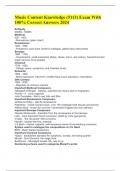
-
Music Content Knowledge (5113) Exam With 100% Correct Answers 2024
- Exam (elaborations) • 6 pages • 2024
- Available in package deal
-
- $12.49
- + learn more
Music Content Knowledge (5113) Exam With 100% Correct Answers 2024 Antiquity 500AD - 500BC Medieval 500 - 1400 - Monophonic (plain chant) Renaissance - Polyphonic voice lines (motet & madrigal), added bass instruments Baroque - Counterpoint, small orchestras (flutes, oboes, horns, and violins), harpsichord and organ become more popular Classical - Strings, opera, symphony, and chamber music Romantic - More expressive, free-form, middle class music education, nationalism 2...
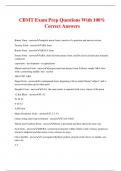
-
CBMT Exam Prep Questions With 100% Correct Answers
- Exam (elaborations) • 14 pages • 2024
- Available in package deal
-
- $12.49
- + learn more
CBMT Exam Prep Questions With 100% Correct Answers Binary Form - answersimplest music form; consists of a question and answer section Ternary Form - answerABA form Rondo Form - answerABACA form Sonata Form - answerABA; derived from ternary form; used by classical and early romantic composers exposition - development - recapitulation Minuet and trio Form - answerprogression from ternary form. Follows simple ABA form with a contrasting middle "trio" section ABA CDC ABA Fugue Form - an...
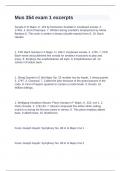
-
Mus 354 exam 1 excerpts Question and answers correctly solved
- Exam (elaborations) • 3 pages • 2024
- Available in package deal
-
- $13.99
- + learn more
Mus 354 exam 1 excerpts Question and answers correctly solved Mus 354 exam 1 excerpts Sonata in D Major, K. 119 by Domenico Scarlatti 2. Keyboard sonata. 3. 1740s. 4. End of baroque. 7. Written during scarlatti's employment by Maria Barbara 8. This work is written in binary (double reprise) form.9. 10. Bach, Handel 1. CPE Bach Sonata in A Major, H. 186 2. Keyboard sonata. 3. 1765. 7. CPE Bach wrote and published this sonata for amateur musicians to play and enjoy. 8. Employs the empfin...
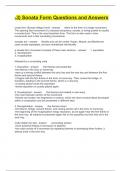
-
S3) Sonata Form Questions and Answers
- Exam (elaborations) • 1 pages • 2024
- Available in package deal
-
- $10.99
- + learn more
S3) Sonata Form Questions and Answers Sonata form (Sonata Allegro form) refers to the form of a single movement. The opening fast movement of a classical symphony, sonata, or string quartet is usually in sonata form. This is the most important form. This form is also used in slow movements and in fast concluding movements. sonatas are flexible and can be varied, Haydn, Mozart, and Beethoven used sonata repeatedly, yet each maintained individuality a sonata form movement consis...
![RCM History 9 [ GLOBAL] Study Guide with Complete Solutions| Review 2025/2026](/docpics/6631846/673703570d5af_6631846_121_171.jpeg)
-
RCM History 9 [ GLOBAL] Study Guide with Complete Solutions| Review 2025/2026
- Exam (elaborations) • 39 pages • 2024
-
- $9.99
- + learn more
RCM History 9 [ GLOBAL] Study Guide with Complete Solutions| Review 2025/2026 Which Italian composer wrote the operas *La Bohème*, *Tosca*, and *Madama Butterfly*? Giuseppe Verdi Giacomo Puccini Vincenzo Bellini Gioachino Rossini Who is known as the "father of the concerto grosso" and wrote *The Four Seasons*? Antonio Vivaldi Johann Sebastian Bach Georg Friedrich Handel Arcangelo Corelli Which movement is the focal point of Franz Schubert's *Symphony No. 8* (...
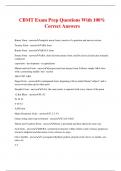
-
CBMT Exam Prep Questions With 100% Correct Answers
- Exam (elaborations) • 14 pages • 2024
- Available in package deal
-
- $12.49
- + learn more
CBMT Exam Prep Questions With 100% Correct Answers Binary Form - answersimplest music form; consists of a question and answer section Ternary Form - answerABA form Rondo Form - answerABACA form Sonata Form - answerABA; derived from ternary form; used by classical and early romantic composers exposition - development - recapitulation Minuet and trio Form - answerprogression from ternary form. Follows simple ABA form with a contrasting middle "trio" section ABA CDC ABA Fugue Form - an...
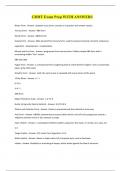
-
CBMT Exam Prep 2024 WITH ANSWERS
- Exam (elaborations) • 14 pages • 2024
- Available in package deal
-
- $8.89
- + learn more
CBMT Exam Prep WITH ANSWERS Binary Form - Answer -simplest music form; consists of a question and answer section Ternary Form - Answer -ABA form Rondo Form - Answer -ABACA form Sonata Form - Answer -ABA; derived from ternary form; used by classical and early romantic composers exposition - development - recapitulation Minuet and trio Form - Answer -progression from ternary form. Follows simple ABA form with a contrasting middle "trio" section ABA CDC ABA Fugue Form - Answer -a contrap...
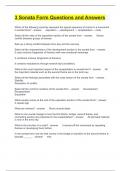
-
3 Sonata Form Questions and Answers
- Exam (elaborations) • 1 pages • 2024
- Available in package deal
-
- $10.49
- + learn more
3 Sonata Form Questions and Answers Which of the following correctly represent the typical sequence of events in a movement in sonata form? exposition → development → recapitulation→ coda Select all the roles of the exposition section of the sonata form. Shows conflict between groups of themes Sets up a strong conflict between tonic key and the new key Select all the characteristics of the development section in the sonata form. It uses motives (fragments of themes) wi...
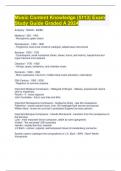
-
Music Content Knowledge (5113) Exam Study Guide Graded A 2024
- Exam (elaborations) • 7 pages • 2024
-
- $11.99
- + learn more
Antiquity - 500AD - 500BC Medieval - 500 - 1400 - Monophonic (plain chant) Renaissance - - Polyphonic voice lines (motet & madrigal), added bass instruments Baroque - - Counterpoint, small orchestras (flutes, oboes, horns, and violins), harpsichord and organ become more popular Classical - - Strings, opera, symphony, and chamber music Romantic - - More expressive, free-form, middle class music education, nationalism 20th Century - - Rejection of common practice Im...

$6.50 for your textbook summary multiplied by 100 fellow students... Do the math: that's a lot of money! Don't be a thief of your own wallet and start uploading yours now. Discover all about earning on Stuvia


